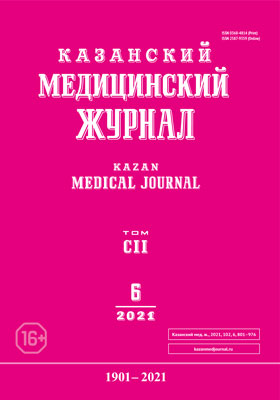Healthcare workers’ perceptions and experiences of communicating with people over 50 years of age about vaccination: a qualitative evidence synthesis
- Issue: Vol 102, No 6 (2021)
- Pages: 972-973
- Section: Cochrane Review Summaries
- Submitted: 06.12.2021
- Accepted: 06.12.2021
- Published: 13.12.2021
- URL: https://kazanmedjournal.ru/kazanmedj/article/view/89785
- DOI: https://doi.org/10.17816/kazmj89785
- ID: 89785
Cite item
Full Text
Abstract
Общение с медицинскими работниками может сыграть важную роль в принятии пожилыми людьми решения о вакцинации. Чтобы помочь принять обоснованное решение о вакцинации, медицинские работники должны уметь определить пробелы в знаниях, потребности и проблемы пожилого человека. Они также должны иметь возможность поделиться и обсудить информацию о риске заболевания человека и тяжести заболевания, об эффективности и безопасности вакцины, а также практическую информацию о том, как человек может получить доступ к вакцинам. Поэтому медицинским работникам необходимы хорошие навыки общения (коммуникаций), и они должны активно держаться в курсе последних доказательств. Понимание их восприятия и опыта общения по вопросам вакцинации может помочь нам в обучении и поддержке медицинских работников и разработке хороших стратегий общения (коммуникаций).
Full Text
The aim of this systematic review was to explore healthcare workers' perceptions and experiences of communicating with older adults about vaccination. We searched for and analysed relevant qualitative studies and included 11 studies.
Key messages. We found few studies that explored healthcare workers' perceptions and experiences of communicating with older adults about vaccination. The studies we found suggested that healthcare workers differed among themselves in what they saw as the aim of vaccine communication and the role of older adults in vaccine decisions. Based on our findings, we developed a set of questions to help planners and programme managers when planning or implementing vaccination communication strategies between healthcare workers and older adults.
What did the review study? Vaccines are available to prevent infectious diseases in older adults, including vaccines against seasonal influenza, pneumococcal diseases, herpes zoster (shingles) and COVID‐19. But older adults do not always use the vaccines available to them.
Communication with healthcare workers can play an important role in older people's decisions to vaccinate. To support an informed decision about vaccination, healthcare workers should be able to identify the older person's knowledge gaps, needs and concerns. They should also be able to share and discuss information about the person's disease risk and disease severity; the vaccine's effectiveness and safety; and practical information about how the person can access vaccines. Therefore, healthcare workers need good communication skills and to actively keep up‐to‐date with the latest evidence. An understanding of their perceptions and experiences of vaccine communication can help us train and support healthcare workers and design good communication strategies.
What were the main findings of this review? We included 11 studies in our review. All studies were from high‐income countries. The studies focused on doctors, nurses, pharmacists and others working in hospitals, clinics, pharmacies and nursing homes. The healthcare workers discussed different types of vaccines, including influenza, pneumococcal and herpes zoster vaccines. The review was carried out before COVID‐19 vaccines were available.
We downgraded our confidence in several of the findings from high confidence to moderate, low or very low confidence. One reason for this was that some findings were based on only small amounts of data. Another reason was that the findings were based on studies from only a few countries, making us unsure about the relevance of these findings to other settings.
Healthcare workers reported that older adults asked about vaccination to different extents, ranging from not asking about vaccines at all, to great demand for information (high confidence in this finding). When the topic of vaccination was discussed, healthcare workers described a lack of information, and presence of misinformation, fears and concerns about vaccines among older adults (moderate confidence).
The ways in which healthcare workers discussed vaccines with older adults appeared to be linked to what they saw as the aim of vaccination communication. Healthcare workers differed among themselves in their perceptions of this aim and about their own roles and the roles of older adults in vaccine decisions. Some healthcare workers thought it was important to provide information but emphasised the right and responsibility of older adults to decide for themselves. Others used information to persuade and convince older adults to vaccinate in order to increase 'compliance' (the extent to which a person correctly follows health advice) and 'improve' vaccination rates, and in some cases to gain financial benefits. Other healthcare workers tailored their approach to what they believed the older adult needed or wanted (moderate confidence).
Healthcare workers believed that older adults' decisions could be influenced by several factors, including the nature of the healthcare worker–patient relationship, the healthcare worker's status and the extent to which healthcare workers led by example (low confidence).
Our review also identified factors that are likely to influence how communication between healthcare workers and older adults takes place. These included issues tied to healthcare workers' views and experiences regarding the diseases in question and the vaccines, and their views and experiences of the organisational and practical implementation of vaccine services.
How up‐to‐date is this review? We searched for studies published up to 21 March 2020.
Glenton C, Carlsen B, Lewin S, Wennekes MD, Winje BA, Eilers R. Healthcare workers’ perceptions and experiences of communicating with people over 50 years of age about vaccination: a qualitative evidence synthesis. Cochrane Database of Systematic Reviews. 2021. Issue 7. Art. No.: CD013706. DOI: 10.1002/14651858.CD013706.pub2. Accessed 19 November 2021.
References
Supplementary files






